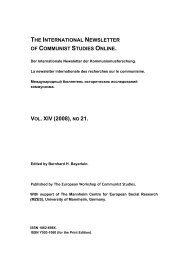11RXNdQ
11RXNdQ
11RXNdQ
You also want an ePaper? Increase the reach of your titles
YUMPU automatically turns print PDFs into web optimized ePapers that Google loves.
population in France, had adopted. His antagonistic relations with the Communist Party<br />
after the war were the result in the first place of his dislike and distrust of Stalinism but<br />
also of his disagreement with the Communist Party line on the French colonies,<br />
particularly Algeria. When the Algerian war began, Sartre was, with Lyotard and<br />
Castoriadis’ Trotskyist group, Socialisme ou Barbarie, one of the few advocates of<br />
independence for Algeria opposed to an Algérie française. When it achieved<br />
independence in 1962, the FLN immediately banned the Communist Party.<br />
V<br />
Sartre’s Marxism was also radically different from the official contemporary version<br />
represented by the Communist Party. Between 1952 and 1954, he published a long<br />
critique of the Communist Party written from the position of a Marxist committed to the<br />
needs and rights of workers and ordinary people rather than the autocratic rule of the<br />
party (Sartre 1968). Sartre’s profound relation to postcolonial theory begins with his<br />
important demonstration of the possibility of bringing Marxism into a productive, new<br />
relation with different systems, forms of thought and experience. This is because in doing<br />
so, Sartre showed himself closest among European Marxists to the contemporary models<br />
of socialism that were being developed in China, Africa, and Latin America. Although<br />
Marxism had been elaborated in new forms directed towards what was known as ‘the<br />
East’ since Sultan-Galiev became director of the Central Bureau of the Muslim<br />
Organizations of the Russian Communist Party, known as the Musburo, in 1919, it was<br />
the victory of Mao Tse-tung in China in 1949 which for the first time signalled a<br />
communist, anti-colonial (China was a ‘semi-colony’) revolution in the Third World, and<br />
the establishment of a specifically Third World or tricontinental form of Marxism. The<br />
Marxism of the anticolonial movements developed into very different forms from those<br />
of European Marxism (official and unofficial), articulating the universal principles of<br />
Marxism to local, vernacular conditions, particularly the needs of the peasantry, whether<br />
it be Mao Tse-Tung in China, the African socialism of the Senghors, Cabral and Nyerere,<br />
or the transculturation of Marxism to the conditions of Latin America by Mariátegui and<br />
Guevara.<br />
Sartre’s ‘Colonialism is a System’ constitutes a thorough analysis of the mechanics of<br />
colonial economics that shows him fully immersed in the perspective developed by Marx,<br />
who argued that colonialism presented capitalism in naked form, stripped of the decorous<br />
clothing of European bourgeois society (Marx 1973:324). Colonialism, Sartre was to add,<br />
also operates in a different temporality from Western capitalism, in the time of its<br />
secondary system; Fanon in turn would point to differences of temporality within the<br />
colonial domain, a ‘time-lag’ between the cosmopolitan modernity of the nationalist<br />
leaders and the peasantry (Sartre 1991:401; Fanon 1965:87). Sartre shows a remarkable<br />
understanding of contemporary ‘Third-World’ differences of perspectives and need, in<br />
his emphasis on the questions of land and the agrarian problem, of the appropriation of<br />
land and resettlement, and, particularly, of landlessness, which have been central to the<br />
problems of many colonies in Africa, Asia and Latin America. At the same time, despite<br />
the specificity of its historical and economic analysis of Algerian colonialism, Sartre’s




